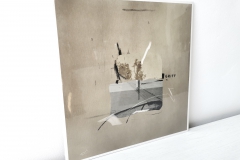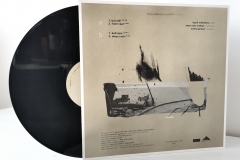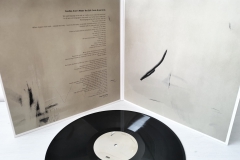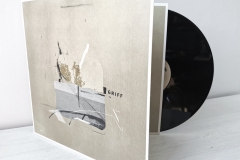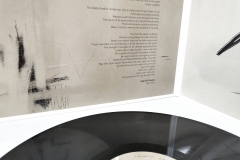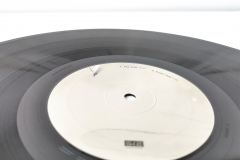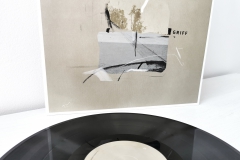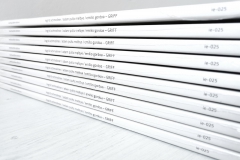Ingrid Schmoliner / Adam Pultz Melbye / Emilio Gordoa – GRIFF
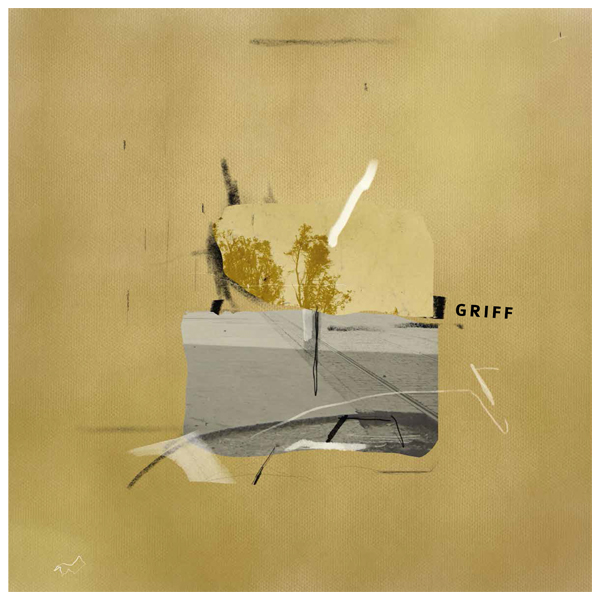
1. But Still (15:32)
2. From Real (7:56)
3. Bell Skin (14:47)
4. Moss Rock (8:41)
5. Which Itch – cd only hidden track (6:42)
· Ingrid Schmoliner: piano
· Adam Pultz Melbye: double bass
· Emilio Gordoa: vibraphone
All music by GRIFF (Ingrid Schmoliner, Adam Pultz Melbye & Emilio Gordoa)
Recorded by Bernhard Rupprecht in Moers, Germany on 19 April 2019
Mixed and mastered by Alexander Yannilos
Liner notes by Andrew Choate
Cover and label artwork by Lena Czerniawska
Graphic design by László Szakács
Produced by: Ingrid Schmoliner & László Juhász
Special thanks to Moers Festival / Improviser In Residence 2019
Kindly supported by SKE – Soziale & Kulturelle Einrichtungen Der Austromechana

Candles Aren’t Water But Still: Drink Drink Drink
We want language to be real, or maybe we just want it to sound real.
Or do we want language to not sound real, but be real, or make real.
Real language is the stuff we hear, they say.
The sound makes it real.
When it goes from real – outside the body – back into the body, via earhair and fleshcushions, more realness.
Undulate with me, but preferably against me.
Reverberate like flesh.
Piano to double bass to vibraphone: which itch, what scratch?
Reverberant bell skin.
Tin rattle pitched to dent.
A new bell, a new skin.
Off-pitch dent muster, creeping plant vine.
Moss on rock.
Rock with moss.
Glow of moss on rock.
Race to slow down, longest.
Growth of fire from two stones.
Music as the ultimate time-lapse sequence.
Real-time zoom-in magnification of infinitesimal to durational.
Shimmering in thanks as response to doubt: now can walk further afield.
Finally unbaffled.
The fatally thankful clunderclap: now a single loose string to tauten or not.
Achieving inexactitude perfectly.
Measures and methods of perfecting inexactitude.
The just-so of an exact presence purring with immateriality.
Practiced polysemy, practical polyphony.
Make a sense to exercise the sensation of meaning.
The how? No please; no thanks.
Pleasure and gratitude are better than that.
Bones are made of flutes not the other way around.
Forget opposites, it’s contradictions in thirds, the better to stick and fit.
The strength of triangles for the ultimate supportive throb.
Candles aren’t water but still – drink drink drink
The moment of losing the intimidation of plants.
An angel made of water lighting candles.
Wilderness of detail delivered in static reframing.
Big, dark, open spaces illuminated with small, light, faint things.
A candle flame always roughly the same size.
But O the shapes.
Half human, half fire.
Half candle, half water.
The parabola of the vital thwack of life.
Andrew Choate
May 2020
Released: December 2020 / first edition of 300 lps & 300 cds
Direct purchase: Bandcamp / Discogs
GALLERY ↓
REVIEWS ↓
“Pianist Ingrid Schmoliner, contrabassist Adam Pultz Melbye, and percussionist Emilio Gordoa play small-variance structures to explore the many facets and complex relationships of repetitive soundings on GRIFF.
This is Schmoliner’s first recording with Melbye or Gordoa, and perhaps the first since her wondrous collaborations with hornist Elena Kakaliagou on Nabelóse and Paraphon in 2017 and 2018. Melbye and Gordoa have previously recorded together, on Berlin Split with Josten Myburgh and Hyvinkää as part of the M0VE 5tet. Schmoliner plays with a percussive yet unaggressive attack here and Gordoa mostly plays vibraphone, allowing this rhythmic unit to not just phase phrases but instrumental identities too, as the vibraphone sometimes assumes the more tonal movement of the piano and the piano sometimes assumes more metronomic pulsings of the percussion.
But Still begins with a little over two minutes of a repeated plucked contrabass phrase, soundings separated with plenty of space. Then the piano, with single notes, moving around the keyboard. And then, a little over two minutes later, the vibraphone, with singles notes, moving among the bars. The staggered entrance recalls setting up a canon, which I’m not sure this is, but the pace of rounds would be so slow as to lapse a listener’s memory of what the repeated phrase is and how it might have changed. The ear is instead at first drawn to the decay of sounds that occupy the space between soundings, which enter in order of increasing duration. While all three instruments quickly establish a cluster of simultaneous sounding, they just as quickly dismantle it. The contrabass seems quite literally the baseline, remaining relatively static, while the piano and vibraphone drift at different tempos. As they recluster towards the end, all instruments have played different pitches and chords. It seems like a slow phasing piece that encourages a close listen to the changing relationships of decay as sounds rearrange themselves in space. From Real feels similar, but faster and looser, with roles changed, and extended technique a little more characteristic of the Echtzeitmusik scene, though never acousmatic, like fluttering and rubbed bass, inside-muted piano, and objects on the vibraphone sounding like a zimbelstern. The dizzying piano variations of Bell Skin recall what makes Steve Reich or Chris Abrahams so exhilarating, and the contrabass and percussion appear less structural and more textural, the latter generating a guttural roar somewhere between a screeching cymbal and blown drumhead and also relieving the piano for a time with its own mallet variations and phasings. As From Real felt like a version of But Still, so Moss Rock feels like a variation of Bell Skin, faster and looser and more textural. That these tracks seem like variations of each other is an interesting scaling of the structural concepts seemingly at play within tracks.” / Keith Prosk, Harmonic Series, 1 March 2021
“GRIFF is the debut album of the free-improvising trio of Viennese pianist Ingrid Schmoliner and the Berlin-based, Danish double bass player Adam Pultz Melbye and Mexican vibes player Emilio Gordoa. All three musicians are sonic searchers, seeking to liberate their instruments and expand and experiment with their sonic pallets with an extensive array of extended techniques, playing inside the prepared piano and attaching objects to its string, bowing techniques and preparations of the bass strings or employing percussive objects. GRIFF was recorded in April 2019 in Moers, Germany, while Goroda was artist-in-residence at Moers Festival.
The poetic liner notes of Andrew Choate capture beautifully the adventurous spirit of GRIFF: ‘…The sound makes it real. / When it goes from real – outside the body – back into the body, via earhair and fleshcushions, more realness./ Undulate with me, but preferably against me. Reverberate like flesh. / Piano to double bass to vibraphone: which itch, what scratch? / Reverberant bell skin. / Tin rattle pitched to dent. / A new bell, a new skin…’.
GRIFF begins with But Still the emphasizes the austere and methodical interplay of this trio. Pultz Melbye deep, resonating double bass introduces the ritualist, slow tone of this piece, soon echoed by the precise hammering of the piano keys by Schmoliner the vibes by Gordoa. The focus is on the sound themselves, how they extend each other’s and converge into a nuanced, tangible and elastic entity, that in its turn keeps expanding. Schnoliner deepens this vein on the following From Real, with an even more sparse but still ritualist atmosphere, with precise contributions of Gordoa and Pultz Melbye that stress the many resonant aspects of this piece.
The last two pieces are totally different. Bell Skin is an urgent and restless whirlwind of repetitive gestures that sound as aimed to knock out the listener from solid ground. The interplay is still methodical but much more tense and dramatic, seeking dramatic collisions but not cathartic climaxes. The focus is still on creating a highly reverberating continuum where the sounds of the prepared piano, the prepared double bass and the vibes merge into one, massive yet elusive entity. Gordoa opens Moss Rock with the sounds of rattling objects, soon answered by Pultz Melbye bowing work and Schmoliner playing inside the piano. This piece also offers again the restless side of the sonic searchers but from a different angle and with a strong focus on its pulse, one that keeps enriching the sonic palette of Schmoliner, Pultz Melbye and Gordoa.” / Eyal Hareuveni, Salt Peanuts*, 13 March 2021
“Das Festival in Moers findet jährlich zu, wie wir (Ex-)Katholikinnen sagen, Pfingsten statt, holy ghost, heuer zum sage und schreibe 50. Mal. Im Vorfeld davon wird immer ein/e Musiker/in ausgewählt, um als Artist-in-Residence vor Ort ein musikalisches Konzept auszuarbeiten, das dann beim Festival selbst zum Tragen bzw. zur Aufführung kommt. 2019 kam der mittlerweile in Berlin ansässige Vibrafonist Emilio Gordoa in den Genuss einer Residency. Was er unter anderem ausheckte, war ein Trio mit dem Kontrabassisten Adam Putz Melbye und der Klavierspielerin Ingrid Schmoliner. Weil das Gepäck ja irgendwo in die Hand zu nehmen war, gaben die drei ihm den Namen Griff. Logisch, nützlich, genial. In Moers wurde dann auch diese vorliegende Aufnahme absolviert, zum Aufwärmen bzw. Abkühlen des Highlights in Nordrhein-Westfalen traf sich das Trio nochmals am Festival New Adits in der Villa For Forest zu Klagenfurt/Celovec. In freiStil #82 stand dazu geschrieben: ‘Die Festivalmotorin Ingrid Schmoliner trifft sich am üppig präparierten Klavier mit dem dänischen Kontrabassisten Adam Pultz Melbye und dem außerordentlich erfindungsreichen mexikanischen Vibrafonisten Emilio Gordoa, der seiner vibrierenden Gerätschaft gern auch mit Geigenbögen, Folien und Aludosen zuleibe rückt. Mit fortschreitender Spieldauer wirkt sich, neben fein aufeinander abgestimmten mikrotonalen Synergien, auch der zunehmende Verzicht auf Dynamik prägend aus’. Die Musik der hier vorliegenden Aufnahme ruht in sich und wirkt inspirierend zugleich. Für die radikale Zupitzung meditativer Ruhe hat man, etwas Geduld vorausgesetzt, auf den Bonus Track ganz am Ende der CD zu warten. Aber dann, mein lieber Schwan! Anders gesagt: Wäre die Musik dieses Trio Mehl, wäre es nicht glatt, sondern griffig.” / Andreas Fellinger, freiStil, April/Mai 2021
“The first track of the album starts with a single repetitive bass tone, played with power and insistency. After 2:30 minutes, a single piano tone brightens the sound of the bass, with ascending notes, after which the vibraphone joins too. The single insistence continues, as does the anticipation and tension. The trio are Adam Pultz Melbye on double bass, Ingrid Schmoliner on piano, and Emilio Gordoa on vibraphone. Gradually the piano and vibraphone chords start moving at different rhythms and instead of emphasising the bass, they now alternate in shifting movements. The listening experience is at the same time refreshing and destabilising, especially as the overall tone gets more dramatic and keeps shifting, slowly moving back to a somewhat altered initial state.
The second track starts with repetitive piano chords, an opening for the other musicians to color the space between, with quiet rumblings, percussions and other sonic bits.
The third track opens with an maddening uptempo neverending circular loop, supported by a slow arco bass and interspersed with high feedback tones. Again, the rhythms shift, and background and foreground switch places. The effect is mesmerising, especially as the density increases and heavy piano chords create a sense of foreboding. The piece turns into an industrial mechanic machine, relentless and tense.
The last track continues in this totally mad intensity of repetitive insistency, and the world sounds different when it suddenly stops.
The CD also contains a hidden track, called Which Itch, which I unfortunately do not have.
The trio has managed to create its own personal type of music, merging minimalism with repetitiveness (à la Reich and Glass) and more modern influences from jazz and improvised music. The result is unique and performed with skill.
More than worth looking for.
The titles on the album are based on this poem by Andrew Choate which – I assume – itself is based on the performance by the trio. The bold underlined parts are the titles of the tracks.
Candles Aren’t Water But Still: Drink Drink Drink
We want language to be real, or maybe we just want it to sound real.
Or do we want language to not sound real, but be real, or make real.
Real language is the stuff we hear, they say.
The sound makes it real.
When it goes from real – outside the body – back into the body, via earhair and fleshcushions, more realness.
Undulate with me, but preferably against me.
Reverberate like flesh.
Piano to double bass to vibraphone: which itch, what scratch?
Reverberant bell skin.
Tin rattle pitched to dent.
A new bell, a new skin.
Off-pitch dent muster, creeping plant vine.
Moss on rock.
Rock with moss.
Glow of moss on rock.
Race to slow down, longest.
Growth of fire from two stones.
Music as the ultimate time-lapse sequence.
Real-time zoom-in magnification of infinitesimal to durational.
Shimmering in thanks as response to doubt: now can walk further afield.
Finally unbaffled.
The fatally thankful clunderclap: now a single loose string to tauten or not.
Achieving inexactitude perfectly.
Measures and methods of perfecting inexactitude.
The just-so of an exact presence purring with immateriality.
Practiced polysemy, practical polyphony.
Make a sense to exercise the sensation of meaning.
The how? No please; no thanks.
Pleasure and gratitude are better than that.
Bones are made of flutes not the other way around.
Forget opposites, it’s contradictions in thirds, the better to stick and fit.
The strength of triangles for the ultimate supportive throb.
Candles aren’t water but still – drink drink drink
The moment of losing the intimidation of plants.
An angel made of water lighting candles.
Wilderness of detail delivered in static reframing.
Big, dark, open spaces illuminated with small, light, faint things.
A candle flame always roughly the same size.
But O the shapes.
Half human, half fire.
Half candle, half water.
The parabola of the vital thwack of life.” / Stef Gijssels, The Free Jazz Collective, 17 April 2021
“I really hate using this word, but there is something eerie about GRIFF. Saying this out loud makes me feel like an amateur but, try as I want, I can’t find a better word. Each piece of music that Ingrid Schmoliner, Adam Pultz Melbye and Emilio Gordoa create is defined by the interplay of the instruments, along with the pauses between the musicians. Instead of writing lavishly flowing scores, here, the trio takes each note as it comes. There is no rush between them. After striking the note, it is allowed to ring out until it fades into oblivion or another musician gets an itchy finger and adds their contribution.
On the opening track, But Still there is not rushed to get to the crux and Schmoliner, Melbye and Gordoa gracefully meander for 15-minutes trying to outdo each other on the eerie, that word again, stakes. This isn’t eerie in an Addams Family way, or a conventional horror film score. Oh no. It’s eerie in a way that I can’t really explain but at times it sends a jolt down my spine that numbs my fingers. It’s a feeling of total unease, but also being totally into it. It’s the feeling you get when you either send the wrong email to the wrong person or know you can’t make it right. It’s the feeling of realising something is lost but knowing nothing you can try will make it better. It’s also the sound of three exceptional musicians doing what they do best. Schmoliner’s piano is delusory sombre. Melbye’s double bass is heavy but subtle, and Gordoa is doing things with a vibraphone that I’ve not really heard before.
The best is definitely saved for last. On the CD at least, which features a bonus, untitled, track. It is effective a series of piano notes, and chords played in unison and allowed to fade out before the next discordant notes are played. There is something harrowing about it, but there is a skewed beauty to it too. By allowing the notes to fade into the ether, rather than hitting us again and again repeatedly, we are allowed to savour the music. Take it for what it is, but without not knowing what to expect next. It’s like when you order something in a restaurant and instead of allowing the food to mix in your mouth, you eat everything independently. You get super specific flavours in your mouth. When they have gone you eat something else, but there is a trace of the previous mouthful still there, so you do get a slightly overlaying of taste. This is what happens on Which Itch, the name the musicians gave the piece of music. It works really well and ends the album on a night, whilst acting as a bookend to the way the album opens. However, using pianos instead of bass.
Overall, GRIFF is a fascinating album that never really lets you know what the point is but gives you just enough to make an informed decision. It’s an album that really works well played in a darkened room around the gloaming. The light from outside is dimming but still bright enough to see, but the shadows in the room take on an eerie texture.” / Nick Roseblade, Vital Weekly, 20 April 2021
“L’album commence étrangement par une note vibrante de contrebasse répétée à l’envi sur une pulsation isolée jusqu’à ce que le piano la rejoigne dans ce mouvement répétitif en imprimant des légères variations de faibles amplitudes et un ou deux changements de rythme. Cette introduction à la première composition, But Still, donne le la d’un album curieux, pas comme les autres qui se distingue radicalement des nombreuses productions qui ont un air de famille avec bien d’autres. C’est le pari d’Inexhaustible Editions, ce label slovaque qui présente de plus en plus régulièrement la fraîcheur de choses nouvelles, inattendues, pointues hors des conventions inhérentes à la free-music, expression aujourd’hui cinquantenaire avec ses codes et sa tradition, ses icônes et valeurs sûres. Vous l’avez deviné, la pianiste Ingrid Schmoliner est une inconnue et avec ses deux collègues Emilio Gordoa, le vibraphoniste argentin de Berlin et Adam Pultz Melbye, le contrebassiste norvégien de Berlin, sont des membres éminents de la nouvelle génération intéressante et ambitieuse. Melbye et Gordoa ont été entendus avec Move d’Harri Sjöström et avec Matthias Müller, ce qui contribue à la cohésion de GRIFF. N’ayant jamais écouté Ingrid Schmoliner auparavant, c’est avec une curiosité récompensée que je me suis plongé dans cet album intrigant, en relevant que la pianiste a enregistré en trio avec Pascal Niggenkemper et Joachim Badenhorst, en solo et en duo avec Elena Kakaliagou pour Corvo Records. Ingrid Schmoliner manie très adroitement les effets hypnotiques de la répétition de plusieurs notes ou d’une ou deux grappes de notes (effet carillon de Bell Skin) en conjonction avec des effets sonores joués par le contrebassiste et le vibraphoniste. Celui-ci utilise l’archet pour faire vibrer les lames de son vibraphone de manière intrigante et fantomatique. Au fil des minutes, bell skin se transforme en happening sonore peu descriptible si ce n’est que la vivacité du carillon contraste avec les constantes vibrations spectrales du vibraphone trafiqué et de la contrebasse striée de coups d’archet, l’ensemble transitant par un parasitage inouï de la cadence initiale par les interventions des deux acolytes, pour mourir avec un decrescendo de notes isolées au vibraphone. Une construction super bien menée. Moss rock développe une idée rythmique similaire au piano préparé, un carillon désarticulé et obsessionel dans lequel s’insère des sons parasites et des accents marqués sur des touches amorties. C’est assez radical comme conception dans le domaine de l’expression texturale ici martelée par un ostinato machinique qu’Emilio agrémente de coups métalliques à même une touche amortie de son vibraphone. Les coups pleuvent comme les marteaux d’une fabrique ensorcelée jusqu’à ce qu’ils s’arrêtent abruptement laissant s’échapper une vibration délétère. Et puis, sadiquement après un long silence, un cinquième morceau bref et non annoncé surgit dans la même veine, maculé de silences. La pianiste frappe littéralement et isolément quelques notes au clavier agrégeant à chaque battue des timbres et des notes différentes, certaines préparées créant un univers sonore mystérieux et hanté. Un projet audacieux et parfaitement maîtrisé en dehors des sentiers battus et illustré dans un beau triptyque avec des œuvres d’art de Lena Czernawiaska et un texte poétique d’Andrew Choate. Inexhaustible Editions est un des labels à suivre par excellence !” / Jean-Michel Van Schouwburg, Orynx-improv’andsounds, 5 May 2021
“Judging by association and appearance, you might expect this trio to play jazz, free improvisation or New Music. But while such influences come into play, they certainly aren’t the whole game. GRIFF (in all caps, it’s the album’s title; with conventional capitalization, it has become the trio’s name) presents a strikingly singular sound that derives from other aspects of the trio’s collective cv.
Ingrid Schmoliner is an Austrian pianist whose work encompasses electro-acoustic improvisation, art song accompaniment and solo prepared piano concerts. Adam Pultz Melbye is a Berlin-based Danish bassist who has improvised with Evan Parker and Michael Zerang, but whose interdisciplinary work includes the development of performance ecosystems involving dialogues between acoustic instruments and digital technology. The Mexican-born, Berlin-based vibraphonist/percussionist Emilio Gordoa also works frequently in multidisciplinary situations involving dancers, film and sound installations. Both Schmoliner and Gordoa make extensive use of preparations and extended techniques to push back against the perceived limits of their respective instruments’ potentials.
But Still opens the record with a single, repeated bass note. After a couple minutes, the other musicians join with similarly sparse contributions. Then the piano, which has been prepared in order to damp its natural resonance, and the vibes start adding further elements that seek to disrupt the cadence that has been sustained throughout, but never quite throw it off course. The parts lock into place like minimalist composition, but the later additions function like out of phase loops, complicating the simple rhythm in ways that’d make a dancer stumble.
The piano, readjusted so that some notes reverberate while others set objects wobbling against the instrument’s interior, takes the lead on the next track, From Real. In time, stark metallic chimes and bass action that echoes the piano’s preparations surface, only to spook the piano into silence. The piece progresses as a cat-and-mouse sequence of provocations, imitations, and withdrawals in which no one’s playing changes much, and yet the music sustains a patient but constant flux.
As the album progresses, it becomes apparent that the group is a human analog to Melbye’s performance ecosystems. The piano and mallet parts can sound almost machine-like. But the ways the music mutates, especially when the bass and vibes resort to sustained tones, feels too intuitive to be programmed. Simultaneously puzzling and inviting, GRIFF is a welcome invitation to keep on guessing.” / Bill Meyer, Dusted Magazine, 20 July 2021
“Po dwóch większych składach, nasze zainteresowanie redukujemy do zestawu trzyosobowego. Nagranie z niemieckiego Moers, z kwietnia 2019 roku, zarejestrowane w okolicznościach studyjnych, powstało z woli i mocy sprawczych następujących muzyków: pianistki Ingrid Schmoliner, kontrabasisty Adama Pultza Melbye’ego oraz wibrafonisty Emilio Gordoi. Składa się z pięciu części, które trwają łącznie prawie 54 minuty.
Muzyka tria – zadekretowana jako all music by the musicians – powstała wedle oglądu recenzenta w drodze skomponowanej improwizacji, która ma swoją z góry zadaną strukturę narracyjną, najczęściej kreowaną przez pianistkę. W każdej z pięciu części Ingrid rysuje dramaturgiczny szkielet utworu i konsekwentnie utrzymuje go przy życiu. Jakby dla niepoznaki, utwór otwarcia początkowo jest efektem pojedynczych szarpnięć na struny kontrabasu. Na repetytywny dźwięk piano czekamy do połowy trzeciej minuty, a na pierwsze frazy wibrafonu kolejne dwie i pół minuty. Muzycy maszerują jak wojsko, akordy brzmią coraz donośniej, ale w pewnym momencie narracja zaczyna tracić swoją linearność i rozmazuje się, niczym obraz nieregularnie bijącego serca na kardiogramie. W drugiej części utworu artyści całkiem swobodnie improwizują, ale na koniec zdają się powracać do rytmu początkowego. Kolejna historia już całkowicie spoczywa na barkach pianistki. Wypuszcza ona dwa szybkie strzały z klawiatury i zasłuchuje się w ciszy. Po chwili dołącza pulsujący bas, a na dźwięki wibrafonu (tym razem, to delikatne dzwoneczki), znów musimy trochę poczekać. Narracja płynie spokojnie, nabiera cech medytacyjnych, ale artyści raz za razem podsyłają nam perełki brzmieniowe, w czym celuje Gordoa.
Utwory trzeci i czwarty budowane są na solidnej postawie rytmicznej. Oczywiście tą, która machinę dynamiki wprawia w ruch jest pianistka. Obie impro kompozycje zdają się być intrygującymi wariacjami na temat Different Trains Steve’a Reicha. Piano repetuje, wspiera go burczący kontrabas, który nie waha się sięgnąć po smyczek, z kolei wibrafon stawia na bardziej delikatne, ale nieczyste, preparowane frazy. Całość z czasem, mimo zadanej struktury rytmicznej (medytacyjnej!), rozpływa się, rozwarstwia, jak ciasto krojone w poprzek linii brzegowej. Ważnym elementem utworu wydaje się być warstwa brzmieniowa, szczególnie wibrafonu, który chwilami nabiera niezwykle siarczystego tembru, przez co całość narracji smakować zaczyna akustycznym post-industrialem. W czwartej opowieści pianistka zaczyna od dźwięków preparowanych, ale echo klasyka minimalizmu dopada ją po niedługim czasie. Nerwowy meta rytm, basowe pulsacje i akcenty percussion wprost ze sztabek wibrafonu dyktowane w niezłym tempie – improwizacja zdaje się kręcić się niczym kolorowy kalejdoskop, zaskakując nas każdą pętlą narracyjną, z czasem nabierając na poły syntetycznego brzmienia. Na finałową opowieść (o której nie wspomina okładka płyty) czekać musimy przy dwuminutowym akompaniamencie ciszy. Muzyka powraca i sprawia wrażenie dalece interesującej repryzy pierwszego utworu. Powtarzane frazy, gra ciszą, medytacyjny dystans na froncie dźwięku. Ów muzyczny dead man walking wiedzie nas na skraj tej doprawdy niezwykłej płyty. Końcowe frazy kreowane są przez narowisty smyczek, zdystansowaną klawiaturę i tajemnicze rytuały wibrafonu. Brawo!” / Andrzej Nowak, Trybuna Muzyki Spontanicznej, 29 October 2021
“Austrian pianist Ingrid Schmoliner has shown up in these pages a few times since 2014, for instance as part of improvising trio Para, and on the rather stern Dwarves Suite record for Corvo Records. On today’s CD GRIFF she is one-third of GRIFF along with Danish player Adam Pultz Melbye on the double bass and Emilio Gordoa (from Mexico City) on the vibraphone, performing their own very distinctive brand of all-acoustic music.
Ingrid Schmoliner has tended to project a slightly foreboding vibe on previous outings, even on the Nabelóse record which supposedly had a compassionate subtext about exiles and alienation. Certainly opening track here, But Still is enough to terrify the unwary, with its implacable and slow progression through dark chords, each musical statement pencilled in with strong, minimal strokes, each gesture like the blow of a judge’s gavel on the desk as they’re about to pass a death sentence. The combination of piano, bass and vibes is utterly inspired, each instrument shining like a sheet of cold silver in a dark sky, but the planned dissonances and enigmatic mood are pretty tough going. 15 and one-half minutes pass with the same sense of dread as a patient sitting in a cancer ward, expecting to hear the worst.
On From Real, I’m hearing in the bell-like sounds a deathly precision and careful attention to note-placement that somehow manages to ‘frame’ and emphasise the space and silence sitting on either side of the notes; once again, the tension is formidable. As two percussion instruments write out our doom one letter at a time, Melbye’s bass groans and purrs with a sadistic delight. The uncanny tune Bell Skin does something to vary the texture with its slightly more uptempo pace, and a concern with generating more resonant blankets of sound and continual murmurs instead of the stark, stand-alone utterances, but the mood remains remorselessly severe. With these clipped two-word tune titles, I’m starting to imagine these are excerpts from a black magic spell, and witch’s cauldron ingredients like Moss Rock and Bell Skin don’t do much to dissuade me. Moss Rock is another uptempo ‘rocker’, and it’s possible Schmoliner has dampened her strings to produce this deadened percussive effect that sounds like a set of steel pans from Hell… and Melbye has now discovered how to make his instrument creak like the timbers of an ancient schooner, such that this track makes sense as a Voyage of the Damned story.
There’s a vinyl edition of this scarifier, but the CD has a hidden track called Which Itch (a pun confirming my fears about the witchcraft themes), where the trio return to their brooding state and play one long decaying chord after another, savouring the sense of utter futility. Andrew Choate has provided a textual note inside, but it doesn’t explain much with its free-associative wordplay and obscure references to ‘an angel made of water lighting candles’ and ‘the parabola of the vital thwack of life’. Likewise, Lena Czerniawska’s abstract artworks on all six panels of the digipak are hard to fathom. Everything about this release is a real enigma. RIYL the Milt Jackson / Mal Waldron Embalmed Corpse LP (Blue Note BLP 1674546, 1965) or the short-lived Morton Feldman ‘ambient death’ experiments from around 1970. Also anything from the burgeoning Witch-Recipe genre, an interesting Black Metal splinter genre.” / Ed Pinsent, The Sound Projector, 3 January 2022
“If Sassoon had to cross the Channel to establish herself in Berlin, other Berlin improvisers come from even farther afield. Vibraphonist Emilio Gordoa is Mexican and the cooperative GRIFF trio features Danish bassist Adam Pultz Melbye who also resides in Berlin and Austrian pianist Ingrid Schmoliner, who so far, still lives in Vienna. With the pianist mostly dedicated to plucking, pinching or stoppering the instrument’s internal strings and Gordoa clanking, rasping or slapping his instrument’s metal bars, the harmonies produced are, in the main, percussive. Currents of sound refract among all three when the bassist adds string pops so that timbres become threatening rather than tuneful. Yet when bell-pealing-like vibraphone tones and dynamic keyboard patterning intersect, reflective lyricism is also present. Making effective use of silences – there’s no sound on the concluding Moss Rock until keyboard chops and vibe reverb are heard two minutes in and the exposition still proceeds with many pauses – the unique set-up also infers extended sound colours. This occurs when Schmoliner’s assembly line of echoes and clinks meets up with equivalent patterning from vibe reverb with the motor switched off. While some sequences are taken staccato and allegro, coordination is most notable on Bell Skin, as a polyrhythmic climax is attained by blending metal bar thwacks, double bass string buzzing and prepared piano string shakes and clatters, completed by a coda of paced ringing of single vibraphone notes.” / Ken Waxman, TheWholeNote, 2 February 2022
RADIO PLAYS ↓
· Godbeni Imperializem at Radio Študent, Ljubljana, 20 May 2021
· No Wave at Tilos Rádió, Budapest, 25 July 2021
· The Sound Projector Radio Show at Resonance FM, London, 21 January 2022

